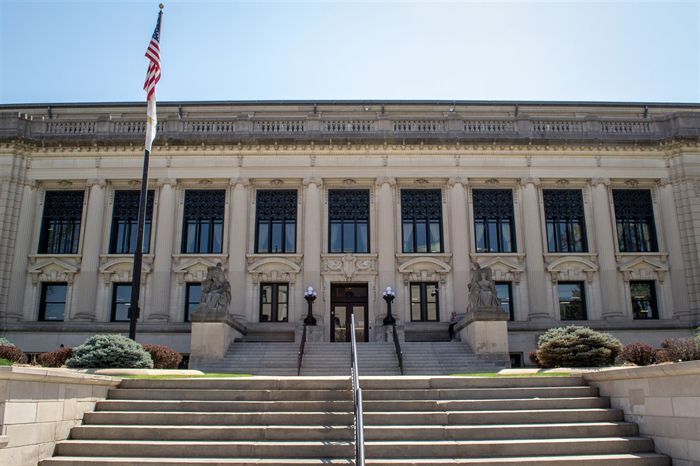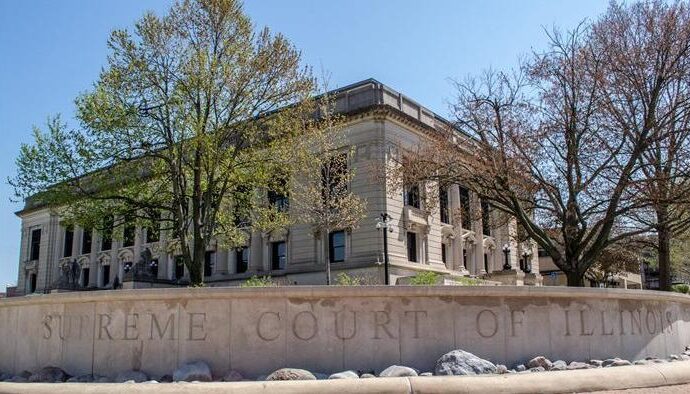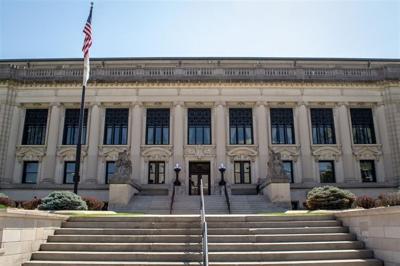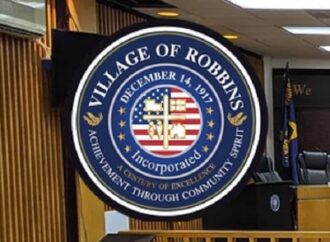The Illinois Supreme Court in Springfield is shown. CAPITOL NEWS ILLINOIS PETER HANCOCK Capitol News Illinois SPRINGFIELD — State courts in Illinois are preparing to return to normal operations after nearly 16 months of operating under special rules brought on by the COVID-19 pandemic. The Illinois Supreme Court on Wednesday issued two new rules that

The Illinois Supreme Court in Springfield is shown.
SPRINGFIELD — State courts in Illinois are preparing to return to normal operations after nearly 16 months of operating under special rules brought on by the COVID-19 pandemic.
The Illinois Supreme Court on Wednesday issued two new rules that call for easing social distancing requirements and reimposing requirements for speedy trials in criminal and juvenile offender proceedings.
“It is important to note that our courts remained open during the COVID-19 pandemic and thousands of court proceedings have taken place via both in-person and virtual hearings,” Chief Justice Anne Burke said in a statement. “However, conducting criminal jury trials has been very difficult. These two orders will help our courts prepare for a return to full scale jury trials.”
On March 17, 2020, a little more than a week after Gov. JB Pritzker issued the first COVID-19 disaster declaration, the Supreme Court issued a sweeping order allowing courts to suspend ordinary deadlines in both criminal and civil proceedings and conduct remote hearings, and restricting access to courthouses throughout the state.
A few days later, on March 20, the Supreme Court issued another order that said any delays in criminal proceedings that resulted from the earlier order would not count toward the requirement for a speedy trial outlined in state law, which generally says defendants are entitled to a trial within 120 days from the date they are taken into custody or, if they are released on bail, within 160 days from the date the defendant demands a trial.
On April 20, the court issued yet another order extending the same allowance for delays to juvenile proceedings.
Those orders came at a time when the state, and Cook County in particular, had been trying to reduce the number of people held in local jails for pretrial detention. It also came just before the Illinois Legislative Black Caucus launched its social justice reform initiative which included a proposal to phase out the use of cash bail, an initiative that was signed into law earlier this year.
The highly-contagious Delta variant is causing a surge in new Covid-19 cases even in countries with high vaccination rates — and experts warn that immunisation campaigns are in a race against time to contain it. Microbiologist Simon Clarke tells us more.
Speaking at a criminal justice reform conference Wednesday, Cook County State’s Attorney Kimberly Foxx said that about 6,000 people were currently being held in the county’s jail, down significantly from the roughly 11,000 people being held there at any given time eight years ago.
And while she did not specifically mention the pandemic rules that paused the speedy trial requirements, she said the jail population had been “significantly lower” than 6,000 at the beginning of the pandemic, “and we’ve seen a steady increase.”
The latest order issued Wednesday calls for returning to normal speedy trial requirements, effective Oct. 1, which gives chief circuit judges 90 days to prepare for the delay to be lifted for both criminal and juvenile proceedings. It also provides that for defendants who were charged before March 20, all days they spent in custody or out on bail will count toward the speedy trial computation.
Another order the court issued in response to the pandemic came on May 20, 2020. It directed judges in each circuit to allow for “appropriate social distancing” in all proceedings and make attempts to reduce the number of people appearing personally for court appearances.
On Wednesday, the court amended that directive, giving chief circuit judges permission to either relax or eliminate entirely any social distancing requirements based on local conditions.
See the new Illinois laws that take effect on or before July 1
665 bills
The Democrat-controlled Illinois General Assembly approved 665 bills this legislative session, with the vast majority awaiting Gov. J.B. Pritzker’s signature.
But, Pritzker has signed 42 bills into law. A handful of those will take effect Jan. 1, 2022, but most went into effect immediately upon signing or will take effect this Thursday.
Here are some notable new laws in effect now or on Thursday that Illinoisans should know.
Election reform
With pandemic-related delays to U.S. Census redistricting numbers, lawmakers moved back the state’s 2022 primary election from March 15 to June 28. The legislation also makes Election Day a state holiday, requires every county to have at least one universal voting center and allow people to be added to a permanent vote-by-mail list. (SB825)
Vote by mail
Some pandemic-induced changes to voting for the 2020 general election, such as vote-by-mail and curbside drop-off, will now be permanent features of future elections. (House Bill 1871)
State legislative redistricting
As they are tasked with doing every 10 years, lawmakers approved new district boundaries for the Illinois House and Senate. The Democrat-drawn maps, which utilized the U.S. Census’ American Community Survey instead of waiting for the decennial census numbers that will arrive later this year, have been challenged in court by Republicans and some other groups. (HB2777)
Illinois Supreme Court redistricting
The nine-person Illinois Supreme Court’s district boundaries were successfully redrawn for the first time since the 1960s. Again, the map is being challenged by Republicans. (SB642)
Police reform
There was no more controversial bill that passed this year than House Bill 3653, also known as the SAFE-T Act, which passed during the lame duck session this January. The provisions ending cash bail and requiring all police to wear body cameras will not take effect until 2023 and 2025, respectively. But starting Thursday, police will be required to render aid to the injured, intervene when a fellow officer is using excessive force and and be limited in use of force. It also offers stricter guidelines for the decertification of officers and would allow people to file anonymous complaints of police misconduct. (HB3653)
Payday loans
Lenders are now prohibited from charging more than 36% annual percentage rate on consumer loans. The average rate in Illinois was nearly 300% prior to the law’s signing. (SB1792)
Vaccine lottery
Tucked into the state’s fiscal year 2022 budget is $10 million for a “vaccine lottery.” All Illinois residents vaccinated by July 1 will be automatically entered into the contest. It includes $7 million in cash prizes to vaccinated adults, ranging from $100,000 to $1 million, and $3 million in scholarship awards to vaccinated youth. (SB2800)
COVID-19 emergency housing
Created guidelines for distributing more than $1 billion in federal stimulus funds for COVID-related housing relief. Also creates automatic sealing of evictions during the pandemic. (SB2877)
Pretrial interest
Victims in personal injury and wrongful death cases will be allowed to collect interest from defendants from the time a lawsuit is filed. It is meant to incentivize settlement of these cases. It was supported by the trial lawyers and opposed by business groups. (SB72)
Casino labor
All casino applicants in Illinois are now required to enter into a project-labor agreement when seeking a new or renewed license. (SB1360)
Crime victims compensation
Provides that a victim’s criminal history or felony status shall not automatically prevent compensation to that victim or the victim’s family. Extends the applicant’s period for submitting requested information to 45 days from 30 days and provides that a final award shall not exceed $45,000, up from $27,000, for a crime committed on or after August 7, 2022. (HB3295)
Electronic signature
Provides that a contract, record, or signature may not be denied legal effect or enforceability simply because it is in electronic form or an electronic record was used in its formation. Provides that if a law requires a record to be in writing, an electronic record satisfies the law. (SB2176)
Stay up-to-date on the latest in local and national government and political topics with our newsletter.




























Leave a Comment
Your email address will not be published. Required fields are marked with *